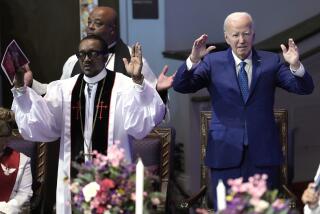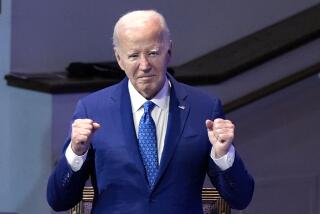Bush Meets With Black Caucus, Gets an Earful
- Share via
WASHINGTON — Members of the Congressional Black Caucus vented their rage on a panoply of racially tinged issues during an hourlong meeting Wednesday evening with President Bush.
The president agreed to work with the black Democrats on election reforms but he neither agreed with their criticisms of nor defended his appointment of John Ashcroft as attorney general, according to meeting participants.
“The meeting was very businesslike, very civil and very relaxed,” said Rep. John Lewis (D-Ga.). “It was an open and candid discussion.”
The need to end racial profiling was another issue members raised with Bush, said Rep. Eddie Bernice Johnson (D-Texas), head of the black caucus.
In his first 11 days in office, the president has courted no group more assiduously than African Americans. But Bush’s gestures also represented an effort to bolster the legitimacy of his presidency.
“He is certainly moving in the right direction--to establish some legitimacy in the eyes of those who feel that he has taken the election away from someone they supported,” said James Thurber, an American University scholar on the presidency.
He and other analysts characterized Bush’s outreach to blacks and other political rivals as a low-risk or no-lose strategy--unless he goes overboard and antagonizes his conservative base.
Bush’s wooing of blacks--a group that voted overwhelmingly for his opponent and then vociferously challenged his claim to the White House--is part of a long-promised effort to “make nice” with friend and foe.
Yet the president’s actions continue to make impressions in the nation’s capital.
Earlier in the day, the president hosted House Minority Leader Richard A. Gephardt for lunch--and surprised the Missouri Democrat on his 60th birthday by having First Lady Laura Bush bring in a cake. Gephardt left with a new biography of Joe DiMaggio.
Tonight, in the first genuine White House social event of the Bush administration, the president will be greeting the extended Kennedy clan. Together, they will view “Thirteen Days,” a movie about the Cuban Missile crisis, which occurred when John F. Kennedy was president.
“I think the president thought it would be a fitting tribute to the Kennedy family to invite them over to watch it,” said White House Press Secretary Ari Fleischer. He added:
“There is an element of reaching out in all the activities the president undertakes.”
But even as members of the black caucus were boarding a bus at the Capitol for the ride to the White House, other influential black leaders warned that Bush’s outreach to blacks will not be enough and that he must follow such gestures with measurable commitments as reflected in budget priorities.
“You judge him by the tone he sets by reaching out but you judge a tree by the fruit it bears,” said the Rev. Jesse Jackson. Referring to congressional Republican leaders, he added: “The forces that restrain him are substantial.”
At the start of his session with the black caucus members--there are 37 but not all of them attended--Bush said:
“This will be the beginning of, hopefully, a lot of meetings. I hope you’ll come back. I’ll certainly be inviting [you].”
Wednesday’s meeting came at the request of the caucus, members said.
In addition to appointing several African Americans to senior posts, Bush since his Jan. 20 inauguration has made a number of other conciliatory gestures toward the black community.
On his second workday, he invited the black mayor of Washington, D.C., Anthony Williams, to the White House for lunch. Since then, Bush has visited a variety of schools and other facilities that serve a predominantly black population. And he attended a service Sunday at a largely black Capitol Hill church.
Although such actions have been widely noticed by African Americans, many were guarded in their praise of the new president.
“You really have to wait to see what the president puts forward,” said Rep. Harold E. Ford Jr. (D-Tenn.).
“Blacks have been the least willing to be won over by Bush’s charms. His meetings with blacks are good things to do but they won’t change the fundamental realities,” said Larry Sabato, a University of Virginia political scientist.
Former President Ford, who also entered the Oval Office with his legitimacy in question, similarly courted blacks, he noted.
“But it still made no difference--and he was more moderate on civil rights than Bush,” Sabato said.
Still, Bush’s courtship of blacks will serve to at least “lower the temperature” in their relationship, he added. “But there are limits.”
Earlier in the day, Fleischer told reporters: “The president has one approach to governing, and he expressed it in his inaugural address, and that is, he is going to be the president for all people in this country--no matter whether they voted for him or not.”
The press secretary also said that Bush is “open-minded” about election reforms.
His meeting with the black caucus was one of many Bush had on Wednesday. Earlier in the day, he met with members of the House Ways and Means Committee and the Senate Finance Committee to discuss his tax cut proposal.
The president also met with representatives of Catholic charities to tout his initiative to encourage federal funding of social services performed by religious groups, conducted his first Cabinet meeting and talked for 15 minutes with Russian President Vladimir V. Putin by telephone.
For the president, the danger in so aggressively courting African Americans and liberals such as Kennedy is that the move could alienate his conservative base, according to Sabato.
“I really think he’s at the edge of the envelope on this now,” the political scientist said.
Yet other analysts noted that Bush cannot afford to stop reaching out. “He has to work every day of his administration to establish legitimacy--in the following sense: The power of the presidency is the power to build coalitions and persuade people to go with you,” said Thurber.
“The issue of legitimacy is going to plague him for rest of his presidency. It’s just a fact of life,” said Norman J. Ornstein, an American Enterprise Institute scholar.
More to Read
Get the L.A. Times Politics newsletter
Deeply reported insights into legislation, politics and policy from Sacramento, Washington and beyond. In your inbox twice per week.
You may occasionally receive promotional content from the Los Angeles Times.










